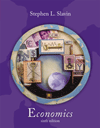As you know, efficiency is central to the study of economics. When you're studying for an economics test, you need to make efficient use of your time. You want to get the highest possible grade after having put in a certain amount of time. I won't tell you to put in more hours - although I wish you would - but I'll tell you how to make the most efficient use of the hours that you do spend studying economics. The most important thing is to create a very detailed summary of the chapters on which you'll be tested. Nearly all students believe that by coming to class and faithfully taking notes, they will get an A-or at least a B. Wrong! Before you come to class, you need to read the pages your instructor assigned. She or he cannot possibly cover more than a fraction of the material assigned. So you need to create a summary of the important points covered in the reading assignment. And what about those points that aren't so clear? You need to make a note of them, and to be sure to ask about them in class. I've always told my students that my basic job is to answer questions about the reading. Of course, if you haven't read the book before class, you won't get any of your questions answered. Then, when you cram the night before the test, your instructor won't be there to answer your questions. Ideally, then, you are creating a summary of each reading before class, you're getting your questions answered in class, and, of course, you're taking notes. If you do this before and during each class, then you'll have an excellent summary of the chapters that you'll need to know for the next test. I'd like you to consider this question: When you study for an exam by cramming the night before, are you using your time efficiently? After all, the night before the exam is prime studying time. And you're spending that night trying to read three or four entire chapters. Not only is that pretty hard to do, but you're reading a lot of stuff that definitely won't be on the exam. What would be efficient would be to study just the stuff that probably will be on the exam. That's why you need to summarize the most important material from each reading assignment starting on the first day of the term. So, in effect, instead of cramming three of four chapters the night before an exam, you're studying 10 or 15 pages at a time, starting at the beginning of the term. OK, it's the night before the exam, or, better yet, it's two nights before the exam. You start going over your summaries of each chapter. Do you really know the material? There's only one way to find out. Test yourself. In addition to answering the workbook questions at the end of each chapter, you can take the 20-question pop quizzes for each chapter that appear on this web site. | 


 2002 McGraw-Hill Higher Education
2002 McGraw-Hill Higher Education

 2002 McGraw-Hill Higher Education
2002 McGraw-Hill Higher Education